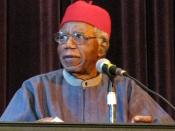Chinua Achebe's "Things Fall Apart" deals with societal changes and how they affect individuals. Resistance to change and the harm such resistance does to people collectively serve as the novel's theme. To support this theme, Achebe relies heavily on characterization, constantly focusing on how Okonkwo's stubbornness slowly destroys him. The author also concentrates on two separate conflicts: that between Okonkwo and the changes occurring around him and that between the Umuofia clan and the Christian missionaries who come to the village. Under attack by the missionaries, the traditional values of Okonkwo's people undergo changes throughout the book, further highlighting the theme's relevance to Okonkwo. Achebe covers great territory over theme, characterization, conflict and values in a proverb spoken by Okonkwo's uncle Uchendu: "There is no story that is not true. . . . The world has no end, and what is good among one people is an abomination with others" (130).
This line elucidates Achebe's theme by depicting the world as having "no end" and thus eternally progressing from the past to the future. In the beginning of the novel, Okonkwo's father Unoka clearly expresses the view that humans have to embrace change in order to appreciate its potential benefits: "Our elders say that the sun will shine on those who stand before it shines on those who kneel under them" (11). Okonkwo is one of "those who kneel under them," refusing to adapt and absorb the sunlight. To him, the change Mr. Brown and the missionaries bring with them is not "good" but rather "an abomination."
In addition to clarifying Achebe's theme, Uchendu's words sharpen his characters and give them distinction. When Uchendu says, "what is good among one people," his words possess a very clear connection to the Christian faith and its appeal to the more malleable...



Pretty Good
There are some good points made in the main body of the essay. However, the majority of the first paragraph is pretty much unnecessary as you are just repeating the plot. But overall a good essay. You could also talk more about Okonkwo trying to save his culture.
0 out of 0 people found this comment useful.